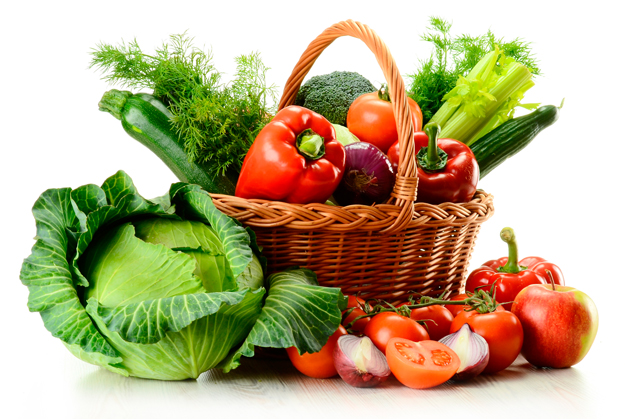Organic Food May Lower Your Cancer Risk
Those who buy organic food are usually pretty convinced it’s better for their health, and they’re willing to pay more for it. A new study suggests cancer risks may be reduced…
What does “organic” Mean?
For food to be certified organic by the Department of Agriculture, produce must be grown without the use of most synthetic fertilizers and pesticides and may not contain genetically modified organisms (GMOs). Meat must be produced by raising animals fed organic food without the use of hormones or antibiotics. Such items now represent 5.5 percent of all food sold in retail outlets.
The Health Benefits
Those who buy organic food are usually pretty convinced it’s better for their health, and they are willing to pay more for it. In the past, the over-riding reason to choose them was not nutritional superiority but to avoid residues of pesticides, other chemicals used on conventional crops, hormones and other drugs fed to conventionally raised livestock. A 2014 meta-analysis of more than 300 studies of the nutrient content of fruits and vegetables found that organic produce has higher concentrations of antioxidants: specifically, about 20-40% more anthocyanins and flavonols. These antioxidant compounds are receiving more attention lately as research is telling us that they can protect cells from the effects of aging, or from the sort of damage that can lead to cancer.
A new study from France just published in JAMA Internal Medicine supports organic food as cancer protective. The study followed nearly 70,000 adults, largely women, for five years. It found that the most frequent consumers of organic food had 25 percent fewer cancers over all than those who never ate organic. Those who ate the most organic fruits, vegetables, dairy products, meat and other foods had a particularly steep drop in the incidence of lymphomas, and a significant reduction in breast cancers. The study was paid for entirely by public and government funds - not the organic food industry - which would appear to make the findings more credible.
Another large study that has asked participants about organic food consumption with reference to cancer was a large British study from 2014, known as the Million Women study. While it found a significantly lower risk of non-Hodgkin’s lymphoma among women who said they usually or always ate organic food, it also found a higher rate of breast cancers in the organic consumers - and no overall reduction in cancer risk. The authors of that study indicated that wealthier, more educated women in the study, who were more likely to purchase organic food, also had risk factors that increase the likelihood of having breast cancer, such as having fewer children and higher alcohol consumption.
For the French study, researchers recruited 68,946 volunteers who were 44, on average, when the study began. The vast majority, 78 percent, were women. Participants provided detailed information about how frequently they consumed 16 different types of organic foods. The researchers asked about a wide range of foods, including fruits, vegetables, dairy and soy products, meat, fish and eggs, as well as grains and legumes, bread and cereals, flour, oils and condiments, wine, coffee and teas, biscuits and chocolate and sugar, and even dietary supplements. Study volunteers provided three 24-hour records of their intake, including portion sizes, over a two-week period.
The information was far more detailed than that provided by participants in the British Million Women study, who responded to only a single question about how often they ate organic.
Participants in the French study also provided information about their general health status, their occupation, education, income and other details, like whether they smoked. Since people who eat organic food tend to be health-conscious and may benefit from other healthful behaviors, and also tend to have higher incomes and more years of education than those who don’t eat organic, the researchers made adjustments to account for differences in these characteristics, as well as such factors as physical activity, smoking, use of alcohol, a family history of cancer and weight.
Even after these adjustments, the most frequent consumers of organic food had 76 percent fewer lymphomas, with 86 percent fewer non-Hodgkin’s lymphomas, and a 34 percent reduction in breast cancers that develop after menopause.
The reductions in lymphomas may not be all that surprising. Epidemiological studies have consistently found a higher incidence of some lymphomas among people like farmers and farm workers who are exposed to certain herbicides through their work. The International Agency for Research on Cancer has classified two pesticides commonly used in farming - malathion and diazinon, as well as the herbicide glyphosate - as probable human carcinogens, and linked all three to non-Hodgkin’s lymphoma. One reason an organic diet may reduce breast cancer risk is because many pesticides are endocrine disruptors that mimic estrogen function, and hormones play a causal role in breast cancer.
There are some limitations to the study to keep in mind however. One of the typical problems with such observational studies is that there are always various confounding factors. Correlation does not necessarily equal causation, or protection in this case. For example, people who eat non organic foods may be less health-conscious and more likely to smoke, drink excessively, eat more sugar, exercise less, etc. People who are health-conscious behave very differently than people who are not, and while the French study attempted to make adjustments, it is not really possible to correct for all of these factors.
The overall evidence does tell us however that simply eating more fruits and vegetables, whether the produce is organic or not, can help prevent a wide variety of diseases including cancer. The American Cancer Society recommends consuming a healthy diet with lots of fruits and vegetables, whole grains instead of refined grains and limited amounts of red meat, processed meat and added sugars.

